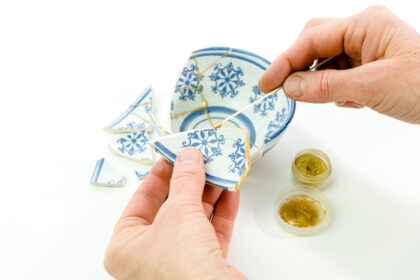This past Sunday, we explored the value of pluralism, acknowledging that we all experience the world in unique ways. As much as we sometimes pretend otherwise, we can’t know another person’s thoughts, experiences, emotions, motivations—unless they tell us. And even then, we have to choose to trust them over the stories we invent in our own minds.
I said in that service that, in order for people to know that there’s something to repair in our relationships, we might have to name what’s ruptured. We might have to say it out loud to them. They may not know there’s anything to repair. Since we experience life through our own unique personal set of filters, we often have completely different interpretations of conversations, tones of voice, facial expressions, and on and on.
Even saying that, I know it seems like putting more work on the person who’s feeling wounded. I feel this too, and a part of me doesn’t like it. I want other people to know that there’s something to fix, and I want them to be responsible human beings! And yet, if I take this value of pluralism seriously, I have to admit that I might be waiting a long time for someone to read my mind and know that there’s something between us that needs to be addressed. My shortest path toward repairing things is to name that there’s a need for repair.
In the larger world, this can be really scary. We never know how another person is going to respond, and our fear is often that speaking up will just lead to us feeling more hurt or misunderstood or unimportant.
In a community of people who share a common vision, though, we might be able to start from a place of trusting that the people around us don’t intend to cause us any harm. The ruptures still happen. We still hurt one another. Because we’re human and we’re not perfect. But we hopefully all want to be able to repair things when that happens. We want to know that we can make amends and offer and receive forgiveness. If we never know what there is to repair, the wounds become permanent.
I believe there is a way (multiple ways, I’d wager) to name a rupture in our relationships and also maintain our commitment to be loving, curious, and respectful. Our mutual promises to create safe and brave space and to offer compassion and care are still meaningful when we’re naming places in our relationships that need repairing. We might have to spend a little time grounding and centering ourselves for that conversation. Which is very different from psyching ourselves up for a battle. But I believe we are capable of holding that complexity.
Maybe that looks like saying, “I wonder if you intended to talk over Zed in that meeting and dominate the conversation. I’m not sure you realized how the tone shifted, but I personally felt like it wasn’t really safe to say anything after that. I want something different for us.”
Or maybe it means saying, “I’ve been holding onto something you said, and I realize that I’m not entirely sure what you meant by it. Can I check it out with you to see if I even understood what you were saying?”
However we approach it, it’s going to feel new. Which is to say, uncomfortable. For us and for the person with whom we’re wanting to repair things. That’s part of practicing a new way of being.
May we continue to hold one another in compassion and care, even as we recognize that we’ll always have some things to repair. We’re human beings, after all. We’re good at making messes. We can be good at cleaning them up, too.
Share this post:
